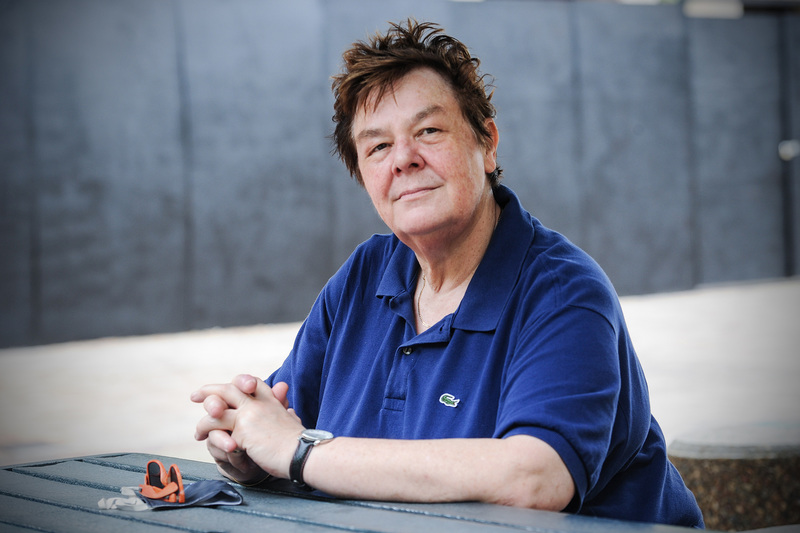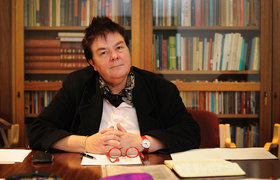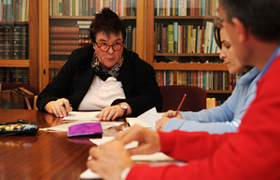‘I have seen UCT transform’ – Professor Hambidge
03 November 2021 | Story Nicole Forrest. Photo and video Lerato Maduna. Read time 6 min.
Although her English surname might seem inconsistent with her vocation, Professor Joan Hambidge is a celebrated Afrikaans poet, literary critic and author. Since starting at the University of Cape Town (UCT) in 1992, Professor Hambidge has seen the institution – and her department – transform.
Studying under the greats
After spending her early life growing up in Pretoria and Standerton, Hambidge completed her undergraduate and honours degrees at Stellenbosch University before returning to Pretoria to acquire her master’s. In 1985 she was admitted to a doctoral programme at Rhodes University under another prolific writer and social commentator, André P Brink.
While her interest in poetry began at a young age – as a Grade 6 pupil she won a Transvaler poetry competition – it was tutelage like this, Hambidge says, that solidified her interest in Afrikaans poetry and literature. “I studied under great poets like DJ Opperman and WEG Louw, as well as famous theorists and linguists like Henning Snyman, Annette Theron and Johan Combrink,” she notes.
However, it was while teaching literature at the University of Limpopo (then the University of the North) from 1980 to 1992 that Hambidge began to flourish as a writer and, following her PhD, she began publishing volumes of poetry at an astonishing rate.
Just a year after obtaining her doctorate, she released Bitterlemoene, which won the Eugène Marais Prize, one of the most coveted literary prizes in South Africa. Since then, another 24 volumes have spouted from her pen, through which she became known for her iconoclastic approach to Afrikaans literary customs and for being the first Afrikaans author to have dealt with lesbianism from an insider’s perspective.
Seeing UCT transform
In 1992, Hambidge came to UCT as a senior lecturer in Afrikaans poetry in UCT’s School of Languages and Literatures where she has taught since. Here, she obtained her second doctorate – this time in cultural studies, focusing on gender constructs in Afrikaans literature.
The school, which is focused on teaching and researching language, literature and cultural studies in Afrikaans, isiXhosa, French, Latin and other languages, has undergone a variety of changes since Hambidge began her tenure.
“The biggest changes I’ve seen in my time at the School of Languages and Literatures has been the Afrikaans and Netherlandic department going from a department with 11 full-time staff members in 1992, reduced to just three full-time staff members,” she says.
“I have seen UCT transform into a multilingual and multicultural university.”
Aside from the contraction of the teaching unit, the transition into a democratic South Africa has meant that Hambidge has witnessed an evolution in the approach to teaching and learning at UCT. “I have seen UCT transform into a multilingual and multicultural university in Africa,” she adds.
This transformation can be seen in the School of Languages and Literatures’ emphasis on investigating the role that languages, literatures and the cultures that they embody have played and continue to play in Africa.
Time for reading and writing
Hambidge’s 29-year career at UCT will come to an end with the 2021 academic year. However, she will initially stay on as a substitute lecturer. After that, she will focus more on her creative projects, a welcome opportunity considering aims to write for eight hours a day.
“I will be teaching next year for a colleague on sabbatical. After that, I will be reading and writing, and doing some ad hoc teaching.”
Summing up her feelings about retirement and leaving UCT, Hambidge is naturally thoughtful about all that she has learned and contributed while teaching and studying at the institution.
“The university was a second education for me. My entire life was here, connecting with people, meetings, lectures and meeting brilliant people who changed and directed my life. I hope that my legacy at UCT will be the work I have done as a mentor in creative writing, and hopefully having instilled a research culture in my young students,” she reflected.
 This work is licensed under a Creative Commons Attribution-NoDerivatives 4.0 International License.
This work is licensed under a Creative Commons Attribution-NoDerivatives 4.0 International License.
Please view the republishing articles page for more information.










